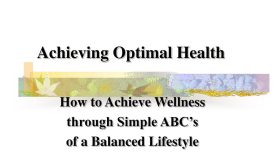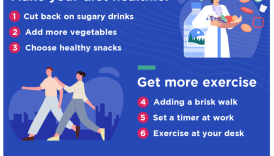10 Simple Steps to Kickstart Your Healthy Lifestyle Journey

Importance of a Healthy Lifestyle
Adopting a healthy lifestyle is not just a trend; it’s essential for both physical and mental well-being. A balanced diet, regular exercise, adequate sleep, and effective stress management contribute significantly to overall health. For instance, maintaining a healthy weight and staying active can reduce the risk of chronic diseases.
- 10 Simple Steps to Kickstart Your Healthy Lifestyle Journey
- Importance of a Healthy Lifestyle
- Benefits of Starting Your Journey Now
- Step 1: Setting Realistic Goals
- How to Define Achievable Objectives
- Creating a Timeline for Success
- Step 2: Nutrition
- Building a Balanced Diet
- Meal Planning Tips
- Step 3: Regular Exercise
- Finding an Exercise Routine You Enjoy
- Incorporating Physical Activity Into Your Day
- Step 4: Stay Hydrated
- Importance of Drinking Enough Water
- Creative Ways to Increase Water Intake
- Step 5: Get Enough Sleep
- Establishing a Nighttime Routine
- Tips for Improving Sleep Quality
- Step 6: Stress Management
- Understanding Stress and Its Effects
- Coping Strategies for Stress Relief
- Step 7: Mindful Eating
- Practicing Mindful Eating Habits
- Listening to Your Body's Hunger Cues
- Step 8: Social Support
- Importance of Surrounding Yourself with a Supportive Network
- Building Healthy Relationships
- Step 9: Regular Health Check-ups
- Importance of Preventive Care
- Monitoring Your Health Progress
- Step 10: Celebrate Your Successes
- Acknowledging Your Achievements
- Rewarding Yourself for Milestones
- Physical Benefits: Improved stamina, strength, and cardiovascular health.
- Mental Benefits: Increased mood stability and reduced anxiety.
Benefits of Starting Your Journey Now
Starting your health journey today can lead to immediate and long-term benefits. Each step taken now creates a foundation for future wellness.
- Immediate Benefits: More energy, better sleep, and improved mood.
- Long-Term Benefits: Enhanced longevity, better quality of life, and increased resilience to stress.
Taking action today means you’re investing in your future, making it a perfect time to start.
Step 1: Setting Realistic Goals
How to Define Achievable Objectives
Setting realistic goals is crucial to staying motivated on your healthy lifestyle journey. Begin by reflecting on what you truly want to achieve. For example, instead of aiming to lose 20 pounds in a month, think incrementally and focus on losing 1-2 pounds per week.
- SMART Goals: Use the SMART criteria—Specific, Measurable, Achievable, Relevant, Time-bound.
- Break it Down: Divide larger goals into smaller, manageable milestones to make them less daunting.
Creating a Timeline for Success
Consider creating a timeline to help visualize your progress. A structured plan fosters accountability.
- Weekly Check-ins: Track your progress weekly, adjusting as necessary.
- Milestones: Celebrate small victories along the way, like sticking to your meal plan for a week.
This approach not just keeps you on track but also makes the journey enjoyable!
Step 2: Nutrition
Building a Balanced Diet
Nutrition plays a pivotal role in your journey towards a healthier lifestyle. A balanced diet ensures you receive the essential nutrients your body needs. Aim to fill your plate with colorful fruits, vegetables, whole grains, and lean proteins.
- The Plate Method: Divide your plate into sections—half for fruits and vegetables, a quarter for lean proteins, and a quarter for whole grains.
- Mindful Choices: Choose foods that are minimally processed to maximize nutrients.
Meal Planning Tips
Effective meal planning can simplify your daily routine and keep you on track.
- Set Aside Time Weekly: Dedicate a few hours each week to plan meals. This can prevent last-minute unhealthy choices.
- Batch Cooking: Prepare large portions of meals and store them for the week. It’s a lifesaver on busy days!
By investing small efforts in planning, you pave the way for a more nutritious lifestyle!
Step 3: Regular Exercise
Finding an Exercise Routine You Enjoy
Exercise doesn’t have to feel like a chore; in fact, finding a routine you genuinely enjoy can make a world of difference. Whether it’s dancing, hiking, or yoga, the key is to select activities that excite you!
- Try Different Activities: Attend a few classes or join local fitness groups to explore what resonates with you.
- Mix it Up: Combining different workouts can keep things fresh and fun, such as alternating between strength training and cardio.
Incorporating Physical Activity Into Your Day
Incorporate movement into your daily routine to seamlessly boost your activity levels.
- Simple Changes: Take the stairs instead of the elevator or go for a brisk walk during lunch breaks.
- Set Reminders: Use phone reminders to stand up and stretch every hour.
By embedding exercise into your life, you’ll find it easier to maintain a consistent routine!
Step 4: Stay Hydrated
Importance of Drinking Enough Water
Staying hydrated is crucial for overall health and wellness. Water plays a vital role in digestion, temperature regulation, and nutrient absorption. When you’re adequately hydrated, you may notice increased energy levels and improved concentration.
- Signs of Dehydration: Fatigue, dry skin, and headaches are common indicators that you may need more fluids.
- Daily Recommendation: Aim for about 8-10 cups of water per day, but adjust based on your activity level and climate.
Creative Ways to Increase Water Intake
Incorporating more water into your day can be enjoyable! Here are some creative tips:
- Infused Water: Add slices of fruits, cucumbers, or herbs to your water for a refreshing twist.
- Fun Containers: Use a colorful reusable water bottle that motivates you to drink more throughout the day.
By making hydration enjoyable, you’ll be more likely to hit your daily water goals!
Step 5: Get Enough Sleep
Establishing a Nighttime Routine
Getting enough sleep is essential for overall health, and establishing a consistent nighttime routine can set the stage for restful slumber. Consider winding down with calming activities that signal to your body it’s time to relax.
- Set a Schedule: Aim to go to bed and wake up at the same time every day, even on weekends.
- Limit Screen Time: Try to disconnect from electronic devices at least an hour before bedtime to reduce blue light exposure.
Tips for Improving Sleep Quality
To ensure you get restful sleep, implement these tips:
- Create a Sleep-Inducing Environment: Keep your bedroom cool, dark, and quiet. Consider using blackout curtains or a white noise machine.
- Mindfulness Practices: Techniques such as meditation or deep breathing can help dissolve the day’s stress before falling asleep.
By prioritizing sleep, you’re investing in your physical and mental well-being!
Step 6: Stress Management
Understanding Stress and Its Effects
Stress can significantly impact both mental and physical well-being. It’s the body’s natural response to challenges, whether they are due to work, relationships, or lifestyle changes. Chronic stress can lead to various health issues such as anxiety, depression, and even heart disease.
- Recognizing Symptoms: Common signs include irritability, fatigue, and trouble sleeping.
- The Importance of Awareness: Understanding your stressors is the first step toward effective management.
Coping Strategies for Stress Relief
Adopting effective coping strategies can help alleviate stress. Here are some approaches to consider:
- Exercise: Physical activity releases endorphins, which enhance mood and reduce stress.
- Mindfulness: Practices like meditation or journaling can encourage relaxation and clarity.
By actively managing stress, you’ll not only improve your well-being but also enhance your resilience against future challenges!
Step 7: Mindful Eating
Practicing Mindful Eating Habits
Mindful eating can transform your relationship with food by encouraging a deeper awareness of your eating habits. This practice involves slowing down, savoring each bite, and truly focusing on your meals without distractions.
- Create the Right Atmosphere: Turn off the TV and put away your phone.
- Savor Each Bite: Pay attention to the flavors and textures, allowing yourself to truly enjoy the food.
Listening to Your Body’s Hunger Cues
Listening to your body is a vital aspect of mindful eating. Tune into your physical hunger signals and eat when you’re genuinely hungry, not just out of habit.
- Hunger Scale: Use a scale from 1 to 10 to assess your hunger—1 being starving and 10 being painfully full. Aim to eat when you’re around a 3 or 4.
- Pause and Reflect: During meals, take moments to check in with your hunger and fullness levels.
By practicing mindful eating, you’ll cultivate a healthier relationship with food and make more intentional choices!
Step 8: Social Support
Importance of Surrounding Yourself with a Supportive Network
Having a strong social support network is vital for maintaining your healthy lifestyle. Friends and family can motivate, inspire, and hold you accountable on this journey. Their encouragement can be the difference between success and giving up when challenges arise.
- Emotional Support: Sharing experiences and feelings helps reduce stress and anxiety.
- Accountability: Engaging family or friends in your health goals can keep you on track.
Building Healthy Relationships
Creating and nurturing healthy relationships is essential for your well-being. Focus on connecting with those who uplift and inspire you.
- Engage in Group Activities: Join fitness classes or community groups that align with your interests.
- Open Communication: Share your goals with close ones and seek their support.
Building a strong support system ensures you’re never alone on your journey to a healthier lifestyle!
Step 9: Regular Health Check-ups
Importance of Preventive Care
Regular health check-ups are a cornerstone of maintaining your wellness. Preventive care allows for early detection of potential health issues, which is critical for successful management. Many conditions, such as high blood pressure or diabetes, can often be addressed more effectively when caught early.
- Routine Screenings: Stay updated with recommended screenings like cholesterol checks, blood pressure measurements, and vaccinations.
- Peace of Mind: Knowing your health status can provide reassurance and motivation to continue making positive lifestyle choices.
Monitoring Your Health Progress
Keeping track of your health progress is essential in making informed decisions.
- Keep a Health Journal: Documenting your meals, exercise, and check-up results can help identify patterns or areas needing attention.
- Regular Assessment: Revisit your health goals and adjust them based on your current status and any advice from your healthcare provider.
By prioritizing regular check-ups, you proactively manage your health—empowering yourself on your wellness journey!
Step 10: Celebrate Your Successes
Acknowledging Your Achievements
Celebrating your successes, no matter how small, is a vital aspect of your health journey. Recognizing the hard work you’ve put in helps foster motivation and reinforces positive habits. For example, if you successfully maintained your workout routine for a month, take a moment to appreciate that achievement.
- Reflect on Progress: Keep a journal where you jot down your accomplishments and the feelings they bring.
- Share Your Wins: Discuss your achievements with supportive friends or family, as this can enhance your sense of accountability.
Rewarding Yourself for Milestones
Setting up rewards for reaching milestones can be highly motivating.
- Non-Food Rewards: Treat yourself to a massage, a new workout outfit, or a day out doing something you love.
- Plan Celebrations: Organize a small gathering with friends to toast your successes!
By celebrating your victories and treating yourself for milestones, you reinforce your commitment to a healthier lifestyle and create an empowering cycle of positivity!





